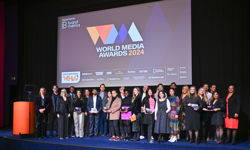The timing of the 2015 Newsworks Shift, looking at the importance of context in the consumption of news, broke kindly for David Dinsmore, the editor of The Sun.
The previous day, the paper had splashed with a classic Sun story under a classic Sun headline - The Wages of Sin – a follow-up to the Church of England’s campaign urging employers to pay a living wage.
“Our reporters discovered that cathedrals up and down the country, including the boss’s one at Canterbury were advertising jobs at well below the living wage,” Dinsmore told the conference.
Within hours, he explained, there were 113 versions of the story online. The MailOnline was first at 4.59 am with the BBC not long after, “long before my readers got out of bed,” the Sun editor added.
In a fighting speech, Dinsmore said The Sun continued to be Britain’s most popular newspaper, its most controversial newspaper and its most ripped-off newspaper and a title with more ABC1 readers than its highbrow rivals.
“As the world becomes increasingly fragmented, our scale becomes ever more important - more than two million copies in print and on digital every day - with no BOGOFs, no giveaways, no bottles of water,” said Dinsmore.
No other medium in the UK, he argued, can deliver five million readers to advertisers every day and only the likes of X Factor or Coronation Street can match such reach, but only for a few minutes every week.
“Our readers’ lives are entwined with the brand and the non-readers are drawn to the flame – oh how they hate themselves for it,” noted Dinsmore wryly.
The context of the conference about the importance of context had been further enhanced by another great newsbrand exclusive.
On the same day that The Sun was tackling ‘The Wages of Sin’, the Daily Telegraph was breaking the story about the two former foreign secretaries in a new “cash for access” scandal.
Newsworks was also able to decorate the walls of the British Library venue with the latest NRS PADD survey showing newsbrands were now reaching 44 million adults in the UK each month, or 86 per cent of the population, through print, online tablets and mobile. The percentage for 15 to 34 year-olds was even higher with almost nine out of ten accessing newsbrands via the four platforms.
The dangers of automated trading
At the conference, a variety of speakers from very different perspectives honed in on the importance of context and the issues raised by cheapest common denominator, online advertising some of which never reaches human eyes.
Rory Sutherland, vice chairman of Ogilvy Group UK, warned that everyone just assumed that digital must be better than print because you can get the same message to people at a lower price.
But what if the bit of advertising that worked was a bit like the display involved in a peacock’s tail - it works precisely because it is perceived to be expensive.
“Instinctively, we understand these differences, the difference between costly communication - what biologists call the costly signal. The standard model, how many people did I reach with this message doesn’t understand that at all,” insisted Sutherland.
If he was right, the legendary adman said “some terrible decisions” were being made in the media industry.
From the quirky Sutherland to original research on media context from Douglas McCabe, chief executive of consultancy group Enders Analysis.
McCabe argued that context really does affect how consumers make decisions, what we buy and how we buy.
“No-one really questions that content is king and yet as automated trading becomes more and more prominent in marketing, no-one really questions whether we are in danger of losing sight of the importance of context,” McCabe said.
If content was king then context is queen.
The research by Enders Analysis and Millward Brown suggests that there are no insuperable difficulties in machine-to-machine, or algorithmic trading, and that the area will continue to grow rapidly.
“But what some people see as teething problems are perceived as fundamental obstacles for others,” the consultant pointed out.
The concerns include a lack of transparency and the fact that as automated trading moves up the value chain, not everyone in the marketplace believes the available tools are fit for purpose, or even fully understood.
One specific fear “rattled around” such discussions.
“The value of quality media for motivating brand engagement is being underrated as a measure, or as an objective or relevant marketing indicator,” McCabe argued.
Digital and automated marketing had risen from close to zero in 2000 but was now close to overtaking the entire advertising spend of traditional or analogue media.
“Some brands fear they are being encouraged into automated solutions before quality thresholds have been fully realised,” he added.
“Programmatic is a sign of the times. But it’s like blind buying which I don’t like,” Matthew Holmes of William Hill told the researchers.
Food group Kraft believes that 75 per cent to 85 per cent of its digital advertising is “fraudulent, unsafe, non-viewable or unknown”. And according to Solve Media estimates, $9.5 billion is being spent on “non-human” traffic generated by online robots.
The value of newsbrands
McCabe argued that newspapers, television and radio were “brilliant” at raising awareness and stimulating interest in potential buyers although not necessarily people buying at that particular moment.
Yet the traditional media were the least valued part of an ecosystem that is focused on transactions and the last click.
“This available and immediate way of measuring marketing is being optimised at the expense of brand building, reputation and long-term objectives,” McCabe argued.
In a panel discussion, Tracy De Groose, chief executive of Dentsu Aegis Network UK, argued that programmatic advertising was a very useful measurement tool which could play an important strategic role for businesses. It was not about algorithms versus humans because algorithms and programmatic advertising could help to inform and shape the decisions of humans.
The conference also heard how BT crafted a £100 million multi-media campaign, in which press played a pivotal part, to launch BT Sport.
Since the second quarter of 2013, the telecommunications company has reached more than five million homes and the television sports channels have played a big part in lifting BT profits by 43 per cent.
The challenge was to get across the message that there was a new high quality player in the television sports business and that Sky Sports no longer had all the best football matches.
Jon Wilson, managing partner at Maxus, said the aim was to dominate in everything from television, radio, newspapers and websites down to individual pubs and outdoor promotion at major sports stadia.
“Most importantly, the sports pages were the place where we could compete with the opposition and give consumers a viable alternative by prioritising key sports and games. Newsbrands were a critical part of that launch,” said Wilson.
In particular, the national press provided the environment to reach “a highly targeted and engaged audience” of 18 to 54 year-old men who were seeking the very matches BT was broadcasting.
No less than 611 advertisements were placed across the national press in five days - “punchy by any standards”.
In total, BT booked over 1,000 individual ads in three months.
“Newsbrands underpinned our launch as part of an integrated multi-media campaign,” explained Wilson who added that regional titles were also used to reach areas of the country densely populated with football clubs, such as the North West and the North East.
Roly Keating, chief executive of the British Library, which stores copies of every newspaper produced in the UK, said despite a number of closures, more print was being created every day than in the past – largely because of the rise of free titles.
The library now has more than 60 million papers from the early 17th century to the present day stored in a modern automated centre in Yorkshire. Ten million pages have already been digitised leaving about 740 million to go.
Election 2015: Wot will win it?
The finale was reserved for no less than six political editors and commentators from the national press.
All were convinced that newspapers would play a key role in May’s general election because the outcome was so unpredictable and close.
Against such a background the impact of newspapers would not have to be very great to be decisive.
The influence would come in a variety of ways. Those who buy newspapers are far more likely to vote than those who don’t.
Newspapers still help to set the agenda for broadcasters, and although the social media are effective at amplifying stories, many of the controversies and discussions begin with political journalists and newsbrands.
And the outcome of the general election? Unless opinion changes markedly in the next few weeks, the political editors have very little doubt.
For Steve Richards of The Independent, opinion polls are more reliable than they have ever been and although Scotland represents a wild card, there will be a hung Parliament with Labour the largest party. It is a view shared by Kevin Maguire of the Daily Mirror.
Andrew Pierce of the Daily Mail believes the Conservatives will be the largest party in a minority government because Labour is facing the loss of between 25 to 30 of its 41 seats in Scotland.
Jonathan Friedland believes the British public do not like Labour leader Ed Miliband and will find a way to make their will felt by returning David Cameron to Downing Street but without an overall majority.
Sue Cameron of the Daily Telegraph said: “I think we are going to have a multi-party government at the end of the day. A minority government and not a formal coalition and it will be much more hand-to-mouth.”
Richards replied: “If you are right and I think you could well be, and there is a minority government, I guarantee there will have to be a second election quickly.”
Such a result could be very good news indeed for newsbrands.












